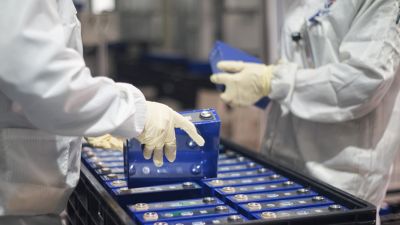On Thursday, 12th October, 2023 a very significant event took place at the mining village of Lado in Nasarawa State. The Nasarawa State Governor, Engr. Abdullahi Sule alongside the Honourable Minister for Solid Minerals, Dele Alake performed the foundation stone laying for the $250 million factory established by Ganfeng Lithium Co. Ltd that will process lithium batteries.
This project for many reasons is highly significant because it is a practical testimony of the vision of the President to turn the solid minerals sector into the next frontier that will bring economic prosperity for Nigeria and Nigerians. In the Renewed Hope manifesto, President Bola Ahmed Tinubu promised to oversee an era of value addition of our abundant solid mineral resources.
At various times, the President and then subsequently the Minister for Solid Minerals, Dele Alake, had stated that the era of mining solid minerals and exporting them purely as raw materials is over. The new solid minerals mining policy requires a mandatory value addition before exporting.
This is the surest pathway to industrialisation and job creation. Mining solid minerals and simply exporting the ores is akin to exporting jobs to other countries. This practice has persisted for decades in Nigeria, which has left our solid minerals sector largely disorganised and most of the time at the artisanal mining level and contributing little to the nation’s GDP.
Lithium exploration and processing is a very promising money spinner. Lithium has become essential in recent years, primarily due to the boom in electric vehicles and other clean technologies that rely on lithium batteries. The global lithium-ion battery market was valued at $52 billion in 2022 and is expected to reach $194 billion in 2030.
Ganfeng Lithium Company Ltd, the Chinese company behind the $250 million factory that hopes to process mined lithium from Nasarawa into batteries, is a market leader in lithium processing. It is the largest lithium salt producer in China and the third largest in the world, as well as the second largest lithium processor in the world.
The price of lithium has risen from $6,000 per tonne in 2020 to $78,000 per tonne in 2022, and it is expected to be the most valuable mineral on earth by 2040. The factory in Nasarawa is expected to process 16,000 tonnes of lithium annually, all of which will be mined in Nigeria. It means, the company can generate over $1.2 billion annually.
With the completion of another lithium processing factory expected to also produce lithium batteries for electric vehicles being constructed in Kaduna state by a Chinese company, Ming Xin Mineral Separation Nig Ltd., Nigeria is fast positioning itself as a hub for production of lithium batteries for electric vehicles.
Nigeria has over 44 identified solid minerals across the country with the Ministry of Solid Minerals Development prioritising the exploitation of seven of these minerals namely, gold, baryte, iron ore, lead/zinc, coal, limestone and bitumen. Lithium is just outside the seven priority minerals but it is still an important job creator and forex earner.
Imagine if lithium that is not even among the seven priority minerals for Nigeria is set to deliver a company with an annual turnover of over $1 billion and providing at least 2,500 jobs to Nigerians, you can imagine what a solid mineral like gold, iron ore baryte or bitumen can fetch us considering their abundance in Nigeria and widespread use.
Nigeria is surely heading to an era where non-oil exports will be contributing at least 5% to GDP (close to the contribution of oil to GDP). With the focus on value addition to our solid minerals, the practice of exporting solid minerals without beneficiation is coming to an end.
With the ongoing multi-sectoral and inter-ministerial collaboration to streamline mining activities and bring an end to illegal corporate/artisanal mining and the security distortion that comes with it, Nigerians can begin to see real value for the abundant solid mineral resources God has blessed us. Hope is truly here!

